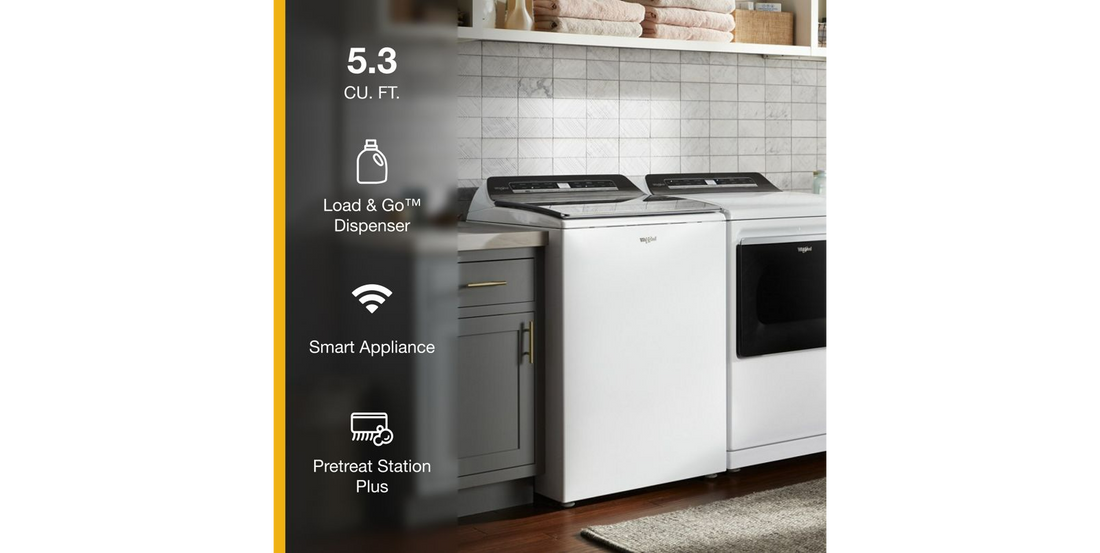
Is a Smart Washer Worth the Investment? Pros and Cons
Share
Is a Smart Washer Worth the Investment? Pros and Cons
In the realm of home appliances, smart washers have emerged as a cutting-edge option, promising convenience and efficiency. But is the investment worth it? In this article, we'll explore the pros and cons of smart washers to help you determine if they are the right choice for your laundry needs.
What is a Smart Washer?
A smart washer is a washing machine equipped with advanced technology that allows it to connect to the internet. This connectivity enables users to control and monitor the machine remotely via a smartphone app, receive maintenance alerts, and even integrate with other smart home systems. The aim is to provide a more streamlined and personalized laundry experience.
Pros of Smart Washers
1. Remote Control and Monitoring
One of the most significant advantages of a smart washer is the ability to control it remotely. With a smartphone app, you can start, stop, or monitor your laundry from anywhere. This feature is particularly useful for busy individuals who want to manage their laundry while at work or running errands.
2. Customizable Wash Cycles
Smart washers often come with customizable wash cycles that can be tailored to specific fabric types and stains. Some models even allow you to download new cycles from the manufacturer, ensuring that you have the latest options for different laundry needs.
3. Maintenance Alerts
Smart washers can notify you when maintenance is required, such as when a filter needs cleaning or if there’s an issue with the machine. This proactive approach can help prevent more significant problems and extend the lifespan of the washer.
4. Energy and Water Efficiency
Many smart washers are designed to be more energy- and water-efficient than traditional models. They can automatically adjust water levels and energy usage based on the load size and type, potentially leading to lower utility bills.
5. Integration with Other Smart Devices
If you have a smart home system, a smart washer can integrate seamlessly with other devices. For example, it can work in conjunction with smart thermostats to optimize energy usage or with smart assistants to provide updates on the laundry status.
6. Enhanced Wash Quality
Advanced technology in smart washers often means better wash quality. Features such as steam cleaning and sensors that adjust wash parameters based on load conditions can lead to cleaner clothes and improved fabric care.
Cons of Smart Washers
1. Higher Initial Cost
Smart washers generally come with a higher price tag compared to traditional washing machines. The added technology and features contribute to the cost, which might be a significant consideration for budget-conscious buyers.
2. Dependence on Internet Connectivity
Smart washers require a stable internet connection to access their full range of features. If your internet service is unreliable or if you experience connectivity issues, you may not be able to take full advantage of the washer's smart capabilities.
3. Potential Security Concerns
As with any connected device, smart washers are vulnerable to cybersecurity risks. Ensuring that your home network is secure and regularly updating the washer's firmware can help mitigate these risks, but it's a factor to consider when investing in smart technology.
4. Complexity and Learning Curve
The advanced features of a smart washer can come with a learning curve. Some users may find the technology complex or overwhelming, especially if they are not particularly tech-savvy.
5. Repair and Maintenance Costs
In the event of a malfunction, smart washers might be more expensive to repair than traditional models due to their complex technology. Additionally, specialized technicians may be needed for repairs, potentially leading to higher service costs.
6. Potential for Obsolescence
Technology evolves rapidly, and there is a risk that a smart washer's features may become outdated as new models are released. This potential for obsolescence could impact the long-term value of your investment.
Conclusion
Deciding whether a smart washer is worth the investment depends on your individual needs and priorities. If you value convenience, energy efficiency, and advanced features, a smart washer may be a worthwhile addition to your home. However, if you prefer to stick with more traditional appliances or are concerned about the higher costs and potential complexities, a conventional washer might be the better choice.
Ultimately, assessing your lifestyle, budget, and comfort with technology will help you make an informed decision. Whether you choose to invest in a smart washer or not, understanding the pros and cons can guide you in selecting the best appliance for your laundry needs.
